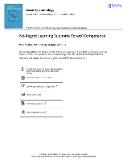No-Regret Learning Supports Voters’ Competence

Datum vydání
2024Publikováno v
Social EpistemologyRočník / Číslo vydání
38 (5)ISBN / ISSN
ISSN: 0269-1728ISBN / ISSN
eISSN: 1464-5297Informace o financování
MSM//LX22NPO5101
Metadata
Zobrazit celý záznamKolekce
Tato publikace má vydavatelskou verzi s DOI 10.1080/02691728.2023.2252763
Abstrakt
Procedural justifications of democracy emphasize inclusiveness and respect and by doing so come into conflict with instrumental justifications that depend on voters' competence. This conflict raises questions about jury theorems and makes their standing in democratic theory contested. We show that a type of no-regret learning called meta-induction can help to satisfy the competence assumption without excluding voters or diverse opinion leaders on an a priori basis. Meta-induction assigns weights to opinion leaders based on their past predictive performance to determine the level of their inclusion in recommendations for voters. The weighting minimizes the difference between the performance of meta-induction and the best opinion leader in hindsight. The difference represents the regret of meta-induction whose minimization ensures that the recommendations are optimal in supporting voters' competence. Meta-induction has optimal truth-tracking properties that support voters' competence even if it is targeted by mis/disinformation and should be considered a tool for supporting democracy in hyper-plurality.
Klíčová slova
jury theorems, meta-induction, no-regret learning, epistemic democracy
Trvalý odkaz
https://hdl.handle.net/20.500.14178/2512Licence
Licence pro užití plného textu výsledku: Creative Commons Uveďte původ 4.0 International






